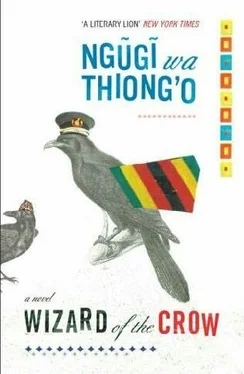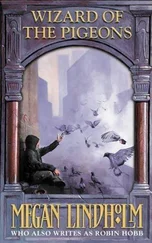The Buler was aghast that the Banks officials would walk out without having heard his economic theories and philosophy and especially his architectural vision for Marching to Heaven.
His jaw fell. His neck became limp and he inclined his head to one side against the wall. His was a silent scream.
“Oh, no, not again,” Machokali said under his breath; dejä vu all over again. He remembered the Wizard of the Crow. He anxiously looked for him all around the chamber but did not spot him among those present. He went to the door, where A.G. was standing.
“The malady of words has struck a second time,” he whispered. “Where is the Wizard of the Crow?”
These must be the representatives from the Global Bank, the Wizard of the Crow thought as he was about to enter the Buler’s infirmary. They must have just finished listening to fresh arguments for the loan from the Buler. But had Machokali not said that they would be here in seven days? Had he been sleeping all that time? I must have been very tired. He turned around and looked hard at the men walking away. There was something familiar about them, yet he could have sworn that he had never met them before. What was it in their looks, their dress, their gait, that made him feel so? And now he could not believe what dawned on him. Their general deportment was exactly like that of some of the people he had encountered in his flight as a bird: was he still dreaming?
He had heard and even read stories of people who walked in their sleep, who could even go to market and buy goods while still asleep, return home, and go back to bed; when they awoke they would wonder how the goods had appeared in their rooms. He had read about the case of a man who had killed his wife and in court claimed that he had sleepwalked through all of it. Was he, the Wizard of the Crow, sleepwalking?
He decided to find out. Instead of entering the Ruler’s room, he went back to his and grabbed his briefcase; in it were pen, paper, all his wordly possessions. He took a lift to the ground floor.
He looked from side to side to spot the three men from the Global Bank. He noticed two beggars, a man and woman, their hands outstretched toward every passerby: I am a veteran, the man said. I am hungry. Have you some change to spare? Where could the threesome have disappeared so quickly? He should not have gone for his briefcase.
Now he saw the three enter a cream-colored limousine. He tried to stop yellow cabs but the drivers sped away from him, one stopping to pick up a white couple farther down the road. Fortunately, a black cab driver came to his rescue. Follow that limousine, the Wizard of the Crow told him.
“True! Haki ya Mungu,” A.C. would say later whenever a listener expressed doubts and tried to dismiss the tale as balderdash. “I am a teller of tales and not a monger of rumors,” A.C. would add, and then, as evidence, he would remind his listeners that he himself had been there. “I was tired, very tired, but Machokali’s question startled me back to life. Where indeed was the Wizard of the Crow? When had I last seen him?
“I now remembered that during those days when all of us were captives of our Ruler’s theories of a world governed by the economy of happiness and sorrow, I never once saw the Wizard of the Crow. It says something of the mesmerizing power of the voice of the Ruler that I never even thought about the Wizard of the Crow. Like everybody else, I had forgotten that it was he who had set free the mouth of the Ruler.
“I left the sick chamber and went to look for him in his room. He was not there. I went down to the reception desk. They had not seen the person I described. I went back to his room. There was nothing that spoke of his presence. Where had he gone? What had happened to him? I went back to Machokali.
“Everything was as I had left it. The Ruler’s mouth still open as if frozen in the act of speaking. The ministers, their faces haggard with fatigue and lack of sleep, heads drooping to one side, were still in their seats, looking for all the world like corpses. Machokali was the only one among them who answered to his name, Ferocious Eyes: he seemed alert to what was taking place, although with him it was not always easy to tell, because his huge eyes were always the same size and never closed, even when he slept. We, the police, were trained to endure hardship, and I was not surprised that most of us were awake and mindful of our calling, guardians of the Ruler and our nation.
“Machokali gestured to me with a slight wave of the hand, and I understood that he wanted us to meet outside. I told him that the Wizard of the Crow had disappeared without a trace. He kept quiet, very quiet, staring ahead, slowly pulling his hair above the right ear, as if his mind had wandered, leaving his body behind. Questions crossed my mind: Had the Ruler succumbed to a heart attack, accounting for Machokali’s state? Where was the Wizard of the Crow, who could raise the dead?”
The Wizard of the Crow settled in the backseat, relieved that the smell from the sick chamber had not followed him into the cab. This was also a good opportunity for him to see the real New York, for since his arrival he had not had the time to stroll outside the hotel.
He thought about the Fifth Avenue VIP Hotel, and soon he was engrossed in comparing the little he had seen of it with others he had seen in Aburfria, and this took his mind away from meditations on reality and illusion.
At a traffic light, the driver noticed that the limousine had stopped a block or so away. Your people have stopped, the driver said, waking him from his introspection. The three men got out and ran across the street as their limo sped away. He asked the taxi driver to pull over, paid him, and then got out of the cab quickly. The men entered an imposing skyscraper. He crossed Global Avenue as if he, too, was bound for the same address. He was mesmerized by the power encased in all that glass and concrete. All the laws and regulations governing the economic and monetary policies of the nations of the earth issued from this building: whatever the tune the Bank sang, the leaders of the earth danced to it; whenever it sneezed, the whole world complained of migraines. What should he do? Enter and confront the three men? Pretend that he was coming for their literature on their role in the development of the new global community? As he approached, still undecided, he passed a side street marked DEAD END.
He was a little dizzy, unable to believe his eyes. This was a scene he had seen while in his bird form. Was this sign an omen? He pondered its possible implications, smiled to himself, and decided to return to the hotel. He was now more focused on the Ruler’s condition than he had ever been.
At the Fifth Avenue hotel, the Wizard of the Crow walked past reception toward an elevator. No matter how hard he pressed the buttons, the elevator would not ascend beyond the third floor. It was the receptionist who cleared the matter. The floors above were private and could be accessed only with a special pass, which he did not have.
The receptionist asked for his last name to look him up in her register. He was about to babble Kamltl wa Karlmlri when he remembered that his passport had a different name, Abdi Mganga, for Sikiokuu’s security reasons, and he had no recollection of having been checked in. The receptionist offered to call the suite, but nobody picked up the phone. There was nothing she could now do for him, she told him, but he was welcome to wait in the reception area; perhaps someone in his party might call or wander down.
He sat; he waited. Why were matters becoming so complicated?
The Wizard of the Crow hung around reception, not knowing what to do with himself. He bought a newspaper but he could not follow the stories. He scrutinized everyone, hoping to catch a glimpse of one of the delegates. A visibly pregnant woman exited a cab and entered the hotel; his eyes followed her until she disappeared. Out of nowhere, he started thinking of Nyawlra as an expectant mother. He had always longed for a family founded on love and respect among husband, wife, and children.
Читать дальше












